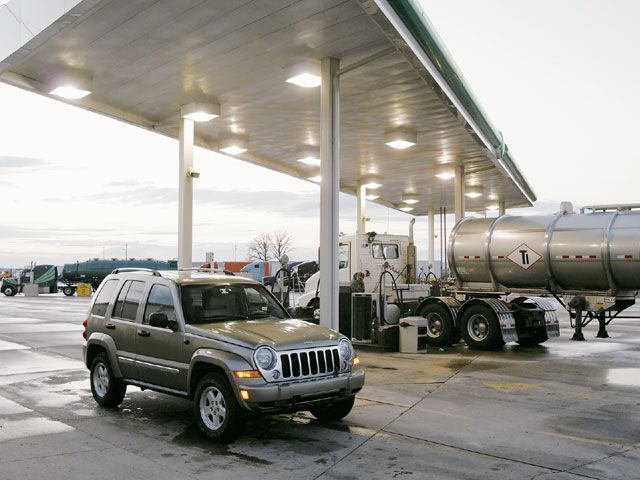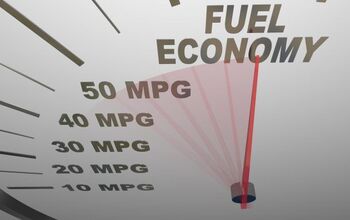Piston Slap: At Liberty To Discuss Fuel Economy?

TTAC Commentator Libertyman03 writes:
Hi, just wanted to say that this is one of my favorite posts on TTAC. I look for Piston Slaps everyday. And since I value the advice, and the comments from the others, I decided to write in with my question: I have a Jeep Liberty (hence my username), and I like it a lot. But it uses SO MUCH GAS.
I have tried changing my driving style, change the oil regularly, change air filters and what not, and still it sucks down gas. It’s an ’03 with 82,000 miles, so it still has lots of life, but I can’t help but think getting rid of it for something more fuel efficient would be a good idea.My question then; what else could I do to stretch the Jeep’s fuel mileage?
Or should I just trade the Jeep on something smaller and more fuel efficient? My parent’s are leaning toward the latter, but I like the 4WD of the Jeep (I live in Pennsylvania, and winters can be pretty bad). If I get a new car, what should I get? I want something pre-owned, preferable 4 or 5 doors, and manual. I would also like to keep it under $8000.
Sajeev answers:
Finding a fuel efficient Jeep Liberty (sans Diesel) is like meeting an honest and transparent PR Flack. So think about this: the more efficiently you drive in the city, the closer you get to the vehicle’s EPA highway mileage rating. If that top figure isn’t acceptable, you got the wrong ride.
But still, addressing mechanical wear or unnecessary body add-ons is mandatory to see some sort of improvement. For example: fixing under inflated tires, removing off-road tires and body ornamentation is a good start. If you have the Liberty’s roof rack or light bar installed, sell them!
Then again, penny-wise and pound-foolish: with an $8000 budget, you’re selling a perfectly good Jeep for somebody’s problems masked behind the sheetmetal of something more efficient. But is it cost efficient? One unplanned trip to the mechanic on your “new” car negates any fuel savings for months. It’s not worth the risk. Who cares if you bought the wrong vehicle? Stick with the enemy you know.
Bonus! A Piston Slap Nugget of Wisdom:
Since all vehicles pass EPA noise pollution guidelines, installing a high flow, cold-air intake actually helps your vehicle’s mileage. Slightly. Very, very slightly.
The logic goes like this: deleting the factory’s intake resonators and necked-down tubing results in less effort at throttle tip-in. And if that decreased effort to reaches the same cruising speed, you burn less gas than before. But the good aftermarket intakes aren’t cheap: and $250 buys plenty of fuel.
The smarter move is to replicate their work via Home Depot plumbing section, capping off resonators and replacing small diameter tube, DIY style. While you might save enough fuel to justify the effort years (yes, really) from now, you’ll enjoy better throttle response and a “cooler” engine note. And you’ll do something entertaining in your spare time: it sure as hell makes me feel better about all the gas I’m burning!
(Send your queries to mehta@ttac.com)

More by Sajeev Mehta
Latest Car Reviews
Read moreLatest Product Reviews
Read moreRecent Comments
- Lorenzo Yes, they can recover from the Ghosn-led corporate types who cheapened vehicles in the worst ways, including quality control. In the early to mid-1990s Nissan had efficient engines, and reliable drivetrains in well-assembled, fairly durable vehicles. They can do it again, but the Japanese government will have to help Nissan extricate itself from the "Alliance". It's too bad Japan didn't have a George Washington to warn about entangling alliances!
- Slavuta Nissan + profitability = cheap crap
- ToolGuy Why would they change the grille?
- Oberkanone Nissan proved it can skillfully put new frosting on an old cake with Frontier and Z. Yet, Nissan dealers are so broken they are not good at selling the Frontier. Z production is so minimal I've yet to see one. Could Nissan boost sales? Sure. I've heard Nissan plans to regain share at the low end of the market. Kicks, Versa and lower priced trims of their mainstream SUV's. I just don't see dealerships being motivated to support this effort. Nissan is just about as exciting and compelling as a CVT.
- ToolGuy Anyone who knows, is this the (preliminary) work of the Ford Skunk Works?


































Comments
Join the conversation
I think in most cases it doesnt make a lot of sense to go from car to car to "save money on gas" unless: 1) You drive a ton of miles and/or your mileage increases signifcantly (double or better) 2) You an also switch from premium to regular (a slight help) 3) the new car is super cheap 4) Brings down your insurance & parts costs (a civics tires & brakes are going to be cheaper than an S2000's or Porsche's) It's VERY hard to recover your money when you may have larger repairs, higher insurance (on a newer car), etc. On the other hand....if safety & cargo space are not important it's NOT too hard to recover your gas money with a motorcycle (esp used) I bought a bike when I was interested in the bike itself (not saving gas) and it's paid off. I doubt I'll EVER recover my gas money on it unless I keep it 10+ years, however it DOES make my monthly costs cheaper in insurance, gasoline and car expenses. Lets compare: 1) STi: Good tires $150-$200 each * 4. Bike, same cost * 2 2) STi: Premium gas averaging 20-21mpg mixed. Bike, 40-45mpg, regular gas 3) STi: insurance @ $150/month when used as primary vehicle (12k+ miles/year). Bike: $35/month full coverage and STi drops to $100/month (6k miles/year) 4) STi: Oil change 2xyear @ $55. Bike: Once per year @ $85 It's not saving me a ton of money but I bought the bike for other reasons (fun), so using it as a gas saver works for me.
I like the looks of the cobalt. I would love to have the SS Sedan. The ultimate sleeper car (IMO). Unfortunately they made them for, what, a whopping 2 years.